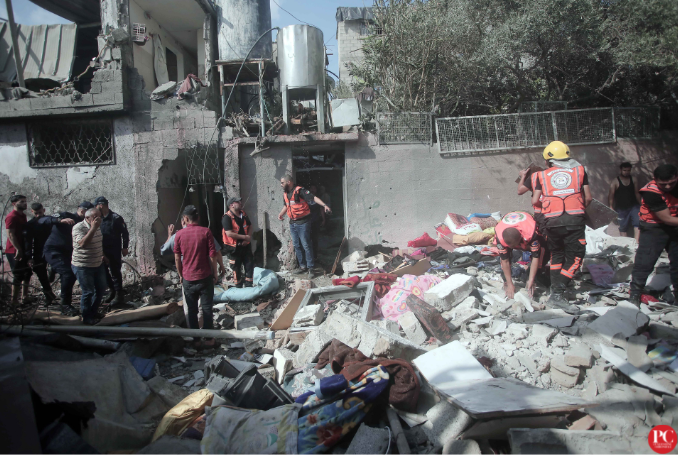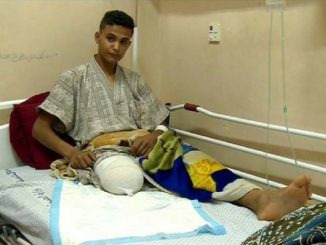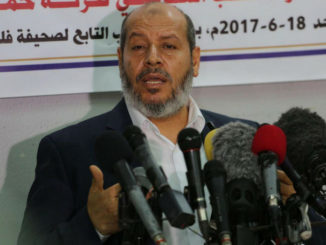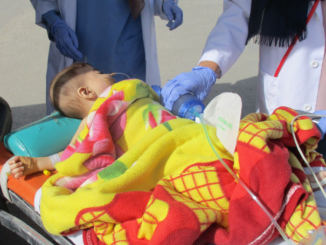
By Benay Blend
“The resistance continues,” writes Ramzy Baroud, “because it must.” The faces of “our beautiful children will remain in our hearts and conscious until those who murdered them pay the price.” There will be no forgiveness, nor will Palestinians forget, because “if we do,” he concludes, “this innocent blood would have spilled in vain.”
As of the latest update, there are over 40 dead and hundreds injured in the latest Israeli siege of Gaza. From August 5 until August 7, Israel has destroyed residential homes, centers of higher learning, and also cut off fuel entering the Strip which left Palestinians with only a few hours of electricity.
Citing an “imminent threat of attack,” Israel initiated the siege by targeting Khaled Mansour, a senior leader of Islamic Jihad, an attack that also killed several civilians, including women and children.
On August 6, National Public Radio (NPR) posted an “Associated Press” (AP) report of the carnage. As usual, it engaged in “both-sides-ism” that focuses on Palestinian “militants” (rather than resisters) vs. the Israeli military. Moreover, by terming Israel’s bombing of Gaza a “conflict” it assumes that both sides carry equal moral weight. In reality, one side is the colonizer, the other the colonized, and the latter under international law has the right to resist.
“So far, we’ve glibly called every massacre Israel commits in Gaza a war,” writes Doaa Alremeili. “But the truth is, we severely lack all the characteristics that would make us an equal adversary. No need to make vain comparisons between Israel’s military technologies and whatever handmade weapons Palestinians have been able to fashion from scratch.”
As usual, too, the AP described the election in 2007 as the “Hamas takeover,” implying that was just caused for the joint Israel/Egypt blockade. In reality, Hamas was duly elected in a process that was overseen by former President Jimmy Carter.
“If you sponsor an election or promote democracy and freedom around the world,” Carter said at the time, “then when people make their own decision about their leaders, I think that all the governments should recognize that administration and let them form their government.”
Apparently, neither Israel nor the Western press have learned that lesson, nor did they mention the upcoming Israeli elections which James North attributes as the cause for the latest round of bombs. There is a “widespread view,” he writes, that Prime Minister Yair Lapid is instigating the conflict to improve his chances” against his opponents in the election.
Samidoun: Palestinian Prisoner Solidarity Network adds that “amid upcoming Israeli elections and internal political chaos among Zionist forces, an assault on Gaza gives current prime minister Yair Lapid and war minister Benny Gantz the opportunity to ‘campaign’ for votes through aggression against the Palestinian people.”
“The connection between an Israeli election and increased violence against Palestinians is nothing new,” North concludes, but it seldom makes its way into mainstream news.
Moreover, after the school shooting in Uvalde, Texas (or really any mass shooting in this country, of which during this past year there have been many) the media has done an excellent job of humanizing the victims. As for Palestine, in this case Gaza, it’s been up to Palestinians and their international supporters to put a human face on the dead.
As the journalist Mohammed Matter most eloquently said: “They had dreams, hopes and wishes. One wanted to be a doctor, the other wanted to be a pilot and the third wanted to be professional football player.” But after the bombing, their bodies under rubble, “Israel turned them and their dreams into pieces.”
Yesterday I spoke in solidarity with Palestine at an anti-war rally memorializing the bombing of Hiroshima. There were several signs that said some variation of “peace.” In all good conscience, I couldn’t talk about peace in the context of Gaza. As I’m writing a cease fire is close at hand, but that won’t end the blockade nor will it bring an end to the suffering, as this round of bombs most likely won’t be the last.
“Everything that’s been happening in Gaza,” Alremeili says, “the series of nonstop attacks on a besieged strip of land, again and again over the course of 15 years, is a twisted and elaborate rendition of the Hunger Games.”
There can’t be peace without justice in Palestine as well as anywhere else there is injustice.
As Prof. Rabab Abdulhadi has said so many times, justice is indivisible, meaning the importance at all times of movements coming together to oppose racism and colonialism wherever it exists. On September 10th, the Palestinian Alternative Revolutionary Path Movement (Masar Badil) has called for a demonstration in front of the Norwegian Parliament building in Oslo.
Labeled a “Demonstration of National Dignity: Palestine from the River to the Sea,” the event calls on all Palestinians and those in solidarity to restore “the national compass and the path of return and liberation as an alternative to the approach of negotiations, surrender and submission.”
The declaration ends with a call to “stand united against racist Zionist colonialism and all projects of liquidation and normalization,” thereby putting forward what Prof. Abdulhadi has said for years, the desire for solidarity across borders, races, genders, and political persuasions (albeit those with political positions that support resistance).
“Generation after generation, our children inherit our pain,” writes Baroud, “but also our Sumud. I am sorry, #Palestinians that it had to be this way. It is our destiny, our fate, but also the very secret of our power. We are a great nation. Our pain makes us even more beautiful.”

– Benay Blend earned her doctorate in American Studies from the University of New Mexico. Her scholarly works include Douglas Vakoch and Sam Mickey, Eds. (2017), “’Neither Homeland Nor Exile are Words’: ‘Situated Knowledge’ in the Works of Palestinian and Native American Writers”. She contributed this article to The Palestine Chronicle.







